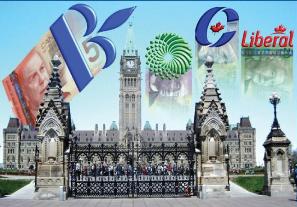The four federalist parties and public subsidies
Shortly after the federal election in October 2008, the Frontier Centre for Public Policy published its first review of public subsidies for political parties. Titled “What Saved the Bloc Quebecois in the 2008 Election: Public Subsidies,” the report found that of all the political parties, the Bloc was the most dependent on the public purse. This was due to its relative inability to raise money from individual donors, the only private source of financing available to political parties after reforms in 2004 banned corporate and union donations. Given that reality, it does not take a great leap of imagination to conclude how much more difficult it would have been for the Bloc to campaign and advertise during 2008 without the large torrent of taxpayer money available to it.
In November 2008, in the federal government’s fiscal update, the minority Conservative government proposed to eliminate the annual allowance, which was introduced in 2004. This allowance is based on the number of votes cast for each party in the most recent federal election, and it allows for an inflation adjustment. As of October 2009, a registered political party annually receives the equivalent of $1.999 per vote —effectively $2 for each vote gained in the previous election. This amount is paid in quarterly installments.
As most readers know, the proposal met with a swift end. The minority Conservative government, only recently re-elected, almost met the same fate. The three opposition parties objected to various aspects of the fiscal update’s proposals. The lack of a “fiscal stimulus” was the public reason for the hasty opposition attempt to remove the Conservatives from power—which is their parliamentary right to do through a non-confidence motion. In reality, the Conservatives likely gave the opposition the incentive, the “glue” to coalesce and oppose the government after the proposed subsidy elimination. With that context, this year’s study adds new data from the past year (riding association transfers to the parties, for example) and provides additional glimpses of how party subsidies affect the political process.